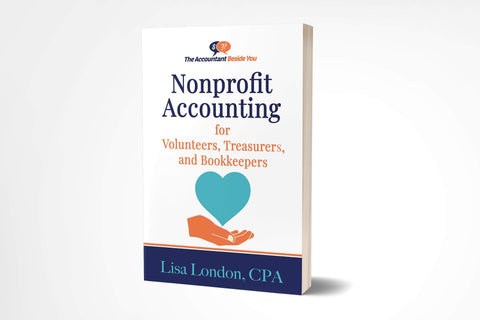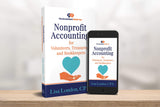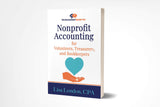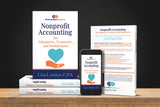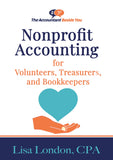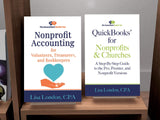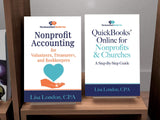Need help with Nonprofit Accounting?
Small nonprofits often have treasurers or bookkeepers with little (if any) accounting experience. As the person responsible for the nonprofit accounting, you have to consider the public, the donors, the employees, and the legal ramifications. If you do not know where to start or are worried about getting in trouble with the IRS, fear not!
With this unique, easy-to-read, detailed guide you will learn how to look after the whole financial well-being of your nonprofit organization. This isn’t some nonprofit accounting for dummies. Written specifically for nonaccountants, this book will empower YOU to take control of your charity’s finances!
This book will show you how to:
- Activate safety measures to keep the cash and the assets safe while preventing theft and errors
- Understand basic accounting standards and what makes nonprofit accounting different
- Establish best practices for nonprofit accounting
- Use a chart of accounts to monitor the flow of money
- Maximize efficiency with accounting software such as Quickbooks
- Follow the necessary steps to start a nonprofit
- Receive, record, and acknowledge different types of donations and other contributions
- Keep track of program revenue and activities
- Detail fundraising events and nonprofit marketing expenses
- Track grants and run donor reports
- Record restricted revenue and costs
- Keep track of your nonprofit general fund and the related transactions
- Understand financial reports, including the Statement of Financial Position (balance sheet) and the Statement of Activities (Profit & Loss)
- Complete W-2s, 1099s, payroll, and reimbursements
- Budget with the priorities of your nonprofit in mind
- Use the included monthly and yearly bookkeeping checklists
- Understand unrelated business income and how it could affect your nonprofit
- Maintain your tax-exempt status by filing the proper nonprofit tax returns
- Complete the Form 990 N, Form 990 EZ, and Form 990-Schedule A and Schedule B, with line by line instructions.
This book provides real-life problems and solutions that nonprofits often face with their bookkeeping. Additional benefits include access to free online resources for your convenience. This book functions well not only as an introduction for beginners but also as a handy reference for the experienced bookkeeper.
Whether you are tracking memberships for your social club or association or involved with community grants, recording the activities and costs properly is crucial. The purpose of having solid accounting financial statements is to give your board the important information they need to achieve the nonprofit's purpose.
You will rest easier knowing you are keeping donors happy, paying employees properly, tracking expenses for your programs, activities, and grants, and giving management the financial reports they need to run the organization.
Lisa London is a CPA and top-selling author with decades of experience who has helped organizations reduce their accounting time dramatically. Her series The Accountant Beside You is written for organizations to understand the basics of nonprofit accounting and bookkeeping with step-by-step instructions, loads of illustrations, and no confusing jargon. With this book, you are never alone--you have The Accountant Beside You.
Using QuickBooks? Bundle to save $5 when you include QuickBooks Online for Nonprofits & Churches or QuickBooks for Nonprofits & Churches. Check the drop-down arrows under Bundle for options.
Available in Paperback and e-Book versions.
ISBN 9781945561153
Pages 234
Copyright 2020 Deep River Press, Inc.
Author Lisa London, CPA
ISNI 0000 0004 5059 7909
You can find all our money-saving bundles for nonprofits clicking here!
Topics by Chapter
1 . Proper Procedures & Internal Accounting Controls- The Need for Strong Internal Controls
- Governing Body's Responsibility
- Separation of Duties
- Basic Controls for Receiving Cash & Donations
- Cash Out And Controls for Paying Bills
- Summary
- Nonprofit Accounting Terminology
- Accounting
- Cash vs. Accrual Accounting Methods
- Chart of Accounts
- Basic Bookkeeping
- Nonprofit Reporting Differences
- Summary
- Time Vs. Money
- Spreadsheets
- Off-The-Shelf Accounting Software
- Online Nonprofit-Specific Accounting Packages
- Summary
- Basic Steps to Start a New Nonprofit Organization
- Organization Bylaws
- Record Retention
- Summary
- Internal Controls and Written Policies
- Counting Money Received In Person
- Making the Deposits
- Recording Donors’ Contributions
- Recording Credit Card Donations
- Summary
- Cash Contributions
- Stock Donations
- Noncash Contributions
- Donated Labor/Services
- Impact of the TCJA (2017 Tax Law)
- Quid Pro Quo Donations
- Gifts of Autos, Boats, and Airplanes
- When You Do Not Need Disclosure Statements
- Summary
- Gifts to Specific Individuals
- Discounts As Donations
- Checks Written to Another Charity
- Summary
- Requirements
- Types of Benevolence Funds
- Disbursement Procedures
- Written Benevolence Policy Example
- Summary
- Terminology
- Approving & Paying the Bills
- Scams
- Insurance & Contracts
- Entering Data
- Allocation of Expenses
- Bills Drafted Out of the Bank Account
- Credit Card Payments
- Petty Cash Replenishment
- Summary
- Setting Up a Reimbursement Policy
- Example of a Reimbursement Policy Resolution
- Employee Business Expenses To Include
- Examples of Proper Reimbursement Items
- Examples of Improper Reimbursement Items
- Standard Mileage Rates
- Reimbursing the Expense
- Volunteer Mileage
- Timing
- Advance Payments
- Ticketless Airline Expenses
- Ramifications of Not Following the Policy
- Inability To Reimburse a Valid Expense
- Summary
- Terminology
- Forms & Publications
- Setting Up the Payroll
- Wages Vs. Salaries
- Determining the Pay Period
- Employee Forms
- Establish Your Payroll Records
- Summary
- Wage Bracket Method
- Percentage Method
- State Tax Withholding
- FICA—Social Security & Medicare Taxes
- The Employee's Payroll Check
- Posting the Payroll Expense
- Other Taxes
- Payroll Tax Deposits
- Payroll Tax Filings With Form
- Year-End Filings
- Ordering IRS Forms
- Summary
- The Budget Process
- Example Budget Spreadsheet
- Monthly Budgeting
- Forecasts
- Cash Flow Analysis
- Summary
- Monthly Processes For Complete Financials
- Bank Reconciliation
- Investment Account Reconciliations
- Generate Reports
- Summary
- Forms W- 2 (Wages) and W- 3 (Taxes)
- Form 940 (Employer's Annual Federal Tax Return)
- Form 1099 (Independent Contractors)
- Form 1096 (Transmittal of U.S. Information Returns)
- Year-End Donor Acknowledgements
- State Filings
- Other IRS Requirements
- Audit Needs
- Summary
- What is Unrelated Business Income for a Nonprofit?
- “Trade or Business”
- “Regularly Conducted”
- “Not Substantially Related” To The Mission
- Excluded Trade/Business Activities
- Examples
- Miscellaneous Excluded Revenues
- 990-T (Exempt Organization Business Income Tax)
- Summary
- Types of 990s (Nonprofit Tax Returns)
- IRS Summary of Forms to File
- Completing Form 990-N (e-Postcard)
- Completing Form 990-EZ (Short Form Return)
- Schedule A (Public Charity Status & Public Support)
- Schedule B (Schedule of Contributors)
- Summary
- Month-End Check List
- Simplified UCOA (Unified Chart of Accounts)

